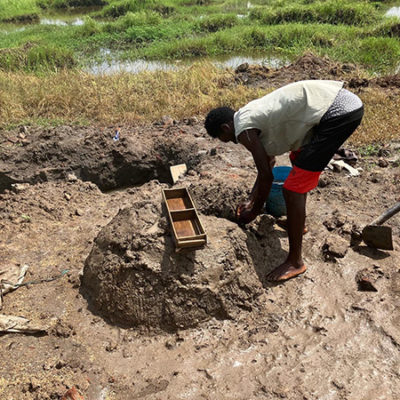I am a Fellow in Medical Anthropology at Exeter College and a Professor in Oxford’s Department of Social Anthropology and Museum Ethnography. I received my BA from Princeton University (summa cum laude, Phi Beta Kappa), where I studied Anthropology and received certificates in European Cultural Studies and Creative Writing. With the support of a Gates Fellowship, I then went on to pursue a PhD in Social Anthropology at the University of Cambridge, investigating the relationships and everyday interactions of the local communities and health care workers involved in a clinical trial for a new malaria vaccine in Gambia. That doctoral project raised several (often confounding) questions about the ethics and social value of global health—questions that continue to animate my scholarship.
Over the years, my research has benefited hugely from the diverse scientific communities and interdisciplinary settings where I have worked. After completing my doctorate, I went on to the London School of Hygiene and Tropical Medicine, where, with the support of a Wellcome Trust Fellowship, I investigated ways of controlling mosquitoes (and the diseases they carry) through improvements in housing and urban infrastructure. I then joined the University of Exeter’s Department of Sociology, Philosophy and Anthropology before taking up a position at the Department of Global Health and Social Medicine at King’s College London. My last stop before coming to Oxford was Princeton’s Institute for Advanced Study, where I spent a year working on new approaches to the design and execution of biomedical research under conditions of emergency—a project inspired from a decade of serving as a member of the WHO Strategic Advisory Group of Experts (SAGE) for Ebola Vaccines and Vaccination.
I serve on the Editorial Board of Economy & Society, Cultural Anthropology, Medical Anthropology Quarterly, Humanities & Social Sciences Communications, and Somatosphere. I am avid runner, love a wild swim and will put hot sauce on just about anything.
Research
Over the past two decades, I have led multiple transdisciplinary collaborations across the diverse research and policy environments associated with global health. While always tethered to specific communities and concrete places, my anthropological work has probed the universalist aspirations of global health by pursuing the distribution of knowledge and technologies from North to South—and back.

My most recent project involves a collaboration with scientists, designers, architects and masons in Tanzania to redesign bricks as a tool for public health. The most commonly-used building artifact in the world, bricks are cheap, durable, modular, low-maintenance, energy-efficient, and have great potential for recycle and reuse. Those properties present an opportunity for the prevention of mosquito-borne diseases—a field of global health practice focused on household protection but dominated by chemical tools that offer little by way of material improvement to local living conditions. Locally sourced, affordable, and aesthetically pleasing, the brick, in contrast, can be enfolded into residential construction processes and priorities, providing the foundations for a more expansive imaginary of healthy and climate-resilient living. The project is driven by a commitment to co-design, placing priority on the input of local masons, builders and residents. Any adaptations to brickwork would need to work along the grain of the vernacular architecture characteristic of hot-humid climates and in view of the incremental process of domestic construction associated by limited and disrupted cash flows. More than a vector control tool, we believe transforming the humble brick can rearticulate aspirations for social progress within an enterprise circumscribed by humanitarian commitments—a global health modern better equipped to meet the needs of our collective thermal future.
Teaching
I teach in the Medical Anthropology Programme, co-leading Critical Medical Anthropology, the core paper for the Masters. I also teach a graduate paper on Anthropologies of the Body which considers how the body is (and has been) articulated by technological, scientific, political and environmental change, for instance, reproductive technologies, artificial intelligence, and anthropogenic activities, and how these changes relate to shifting conceptions of the relationship between our bodies and being human, shapes which bodies count as human and how that humanity is imagined in the future.
Selected Recent Publications
Forthcoming, Kelly, A.H. & Lezaun, J. Vectors: Global Health in The Aftermath. Durham: Duke University Press.
Street, A. & Kelly, A.H. Tolerable Tests: Regulating Diagnostic Innovation in a Global Health Emergency, lessons from Ebola. Science, Technology and Human Values, https://doi.org/10.1177/01622439241252709
Adams, V., Chandler, C., Kelly, A.H. Livingston, J. 2024. A Pandemic of Metrics. Medical Anthropology Quarterly, https://doi.org/10.1111/maq.12842
Kelly, A.H., Lezaun, J. & Street, A. 2024. Global health, accelerated: Rapid diagnostics and the fragile solidarities of ‘emergency R&D’, Economy and Society, 51:2, 187-210.
Jensen, N., Barry, A., & Kelly, A. H. More-than-national and less-than-global: The biochemical infrastructure of vaccine manufacturing. Economy and Society, 1-28.
Herrick, C., Kelly, A. H., & Soulard, J. 2022. Humanitarian inversions: COVID‐19 as crisis. Transactions of the Institute of British Geographers, 47 (4): 850-865
Kelly, A.H. and Lezaun, J., 2021. The Immune Home: Domestic Enclaves, Diffuse Protections. Cultural Anthropology, 36(4), pp.563-572.
Kameda de Carvalho, K. Kelly, A.H., Lezaun, Löwy, I., 2021. Imperfect diagnosis: the truncated legacies of testing during the Zika emergency. Social Studies of Science, 51(5):683-706
Street, A. and Kelly, A.H., 2021. Medical testing, diagnosis and value. Medicine Anthropology Theory, 8(2), http://www.medanthrotheory.org/issue/view/387
Kelly, A.H.; Lezaun, J. Löwy, I., Matta, G.; Nogueira, N. Rabello, E. Uncertainty in times of medical emergency: knowledge gaps and structural ignorance during the Brazilian Zika crisis, Social Science & Medicine, 246, 112787.
Kelly, A.H., Keck, F. Lynteris, C. 2019. Anthropology of Epidemics. London: Routledge.
Kelly, A.H. 2018. Ebola Vaccines, Evidentiary Charisma and the Rise of Global Health Emergency Research, Economy & Society, 46 (3): 135-161.
